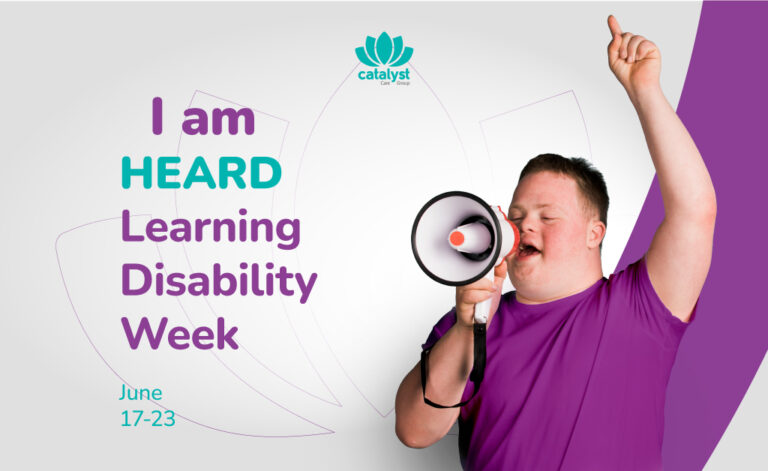A care plan is much more than a document- it’s a dynamic reflection of someone’s life, needs and preferences. As people grow, change, and face new challenges or opportunities, their support should evolve with them.
Regular reviews make sure that care stays relevant- not just clinically, but personally. When support aligns with what matters day to day, it becomes easier to avoid unnecessary hospital stays and helps people stay independent, confident that the right help will be there, just as life happens.
What is a Care Plan?
A care plan is a shared guide that shows us how best to support people in our care. It reflects person’s health needs, daily routines, strengths, preferences, and the kind of support that will make a real difference- at home, in the community, and with the people around them.
Rather than being just a piece of paper, it’s a way of making sure care is consistent, respectful, and truly personal.
Key components include:
- Health needs – medical conditions, ongoing treatments, medication, and appointments.
- Support needs – help with daily living such as washing, dressing, eating, or mobility.
- Personal preferences – routines, likes and dislikes, cultural or religious needs, and how someone wishes to be supported.
- Communication needs – how the person expresses themselves and how they prefer to be spoken to.
- Risk management – known risks and how to reduce or respond to them (e.g. falls, self-harm, choking).
- Emergency planning – what to do if a usual carer is unavailable or health suddenly changes.
- Involvement of others – who is part of the person’s support circle (family, friends, professionals).
A care plan is created with the person at the centre, often involving carers or advocates. It’s reviewed regularly and updated when circumstances change. A well-written plan helps improve health outcomes, reduces hospital admissions, and supports independence.
Principles of Person-Centred Care Planning
Person-centred care planning starts with the person- not the diagnosis, the service, or the paperwork. It’s about taking time to understand what makes someone feel safe, respected, and in control of their life. This approach focuses on real conversations, shared decisions, and support that fits around how someone lives, rather than the other way around. Whether planning for everyday routines or long-term care, it’s about recognising each person as an expert in their own life.
Personalised Approach to Health and Wellbeing
The best way to implement a personalised approach in care is by using Maslow’s hierarchy of needs as a guiding framework. This means looking beyond clinical or practical tasks and understanding the full range of what someone needs to feel well, safe, and valued.
A truly effective care plan takes into account not just physical health, but also emotional security, social connection, a sense of purpose, and opportunities for personal growth. It’s about seeing the whole person- acknowledging what matters to them, not just what’s written in their file- and shaping support that meets those needs in a meaningful, consistent way.
- Basic Physiological Needs: This includes essential elements for survival such as nutrition (food and water), elimination (toileting), breathing (airway management, oxygen), circulation (pulse, blood pressure), sleep, shelter, physical intimacy, and exercise.
- Safety and Security: Focuses on preventing injury (e.g., using side rails, call lights, proper hygiene, isolation precautions, fall prevention) and creating a trusting, safe environment through therapeutic relationships. Also includes education on managing risks such as those related to stroke and heart disease.
- Love and Belonging: Encourages the development of supportive relationships, addressing social isolation (e.g., bullying), and fostering emotional connections through techniques like active listening and therapeutic communication, including maintaining intimacy in relationships.
- Self-Esteem: Involves gaining acceptance within the community and workplace, achieving personal goals, fostering a sense of control or empowerment, and feeling comfortable with one’s physical appearance.
- Self-Actualisation: Supports growth towards reaching one’s full potential, including spiritual development, the ability to understand different perspectives, and creating an environment that nurtures personal growth.

Promoting Autonomy and Choice
Promoting autonomy and choice is about empowering people to make decisions that directly affect their lives, allowing them to have control over the support they receive. It’s about offering options, respecting preferences, and encouraging self-expression, so people feel valued and confident in their ability to navigate daily life.
When making an effort to truly understanding people’s needs, we support them to exercise their rights, make informed choices, and maintain a sense of independence, which is essential for overall well-being.
Why Regular Reviews are Necessary?
Regular reviews of care plans are essential to ensure they continue to meet the changing needs of people. For example, someone may have enjoyed drinking tea for many years, but over time, their preference might change, and they may no longer feel the same way about it. If this shift isn’t recognised and addressed, it could impact their overall quality of life and wellbeing.
It is similar with people’s physical, medical, and social needs. Regular reviews ensure that care remains relevant and responsive to their evolving physical, medical, and social requirements, helping to maintain their quality of life and independence.
Changing Health Needs and Conditions
As health needs and conditions evolve, it’s essential for healthcare professionals to remain proactive in assessing and adapting care plans. People’s physical and mental health can change over time, requiring adjustments to treatments, medications, and support.
Healthcare professionals play a vital role in monitoring these changes and ensuring that care plans are updated to reflect the person’s current needs. By staying attuned to shifts in health, they can help prevent complications, promote wellbeing, and provide the right support at the right time.
Enhancing Quality of Care and Outcomes
Enhancing the quality of care and outcomes is about adopting a holistic approach that addresses the full range of a person’s needs, from health to emotional and social support. By focusing on positive outcomes, care can be more than just managing symptoms- it’s about improving overall life quality.
This means providing care that is flexible and responsive to changes, fostering a sense of empowerment, and ensuring that people are supported in a way that helps them lead fulfilling lives. With this approach, the result is a more personalised experience that leads to better health and wellbeing in the long run.
When and How Often Should Care Plans Be Reviewed?
Care plans should be reviewed regularly to ensure they remain relevant and effective, and the frequency of these reviews can depend on various factors. Here’s an outline of when and how often care plans should be reviewed:
- Initial Review: After the care plan is created, a review should take place within the first few weeks to ensure everything is on track and to make any adjustments based on initial feedback or observations.
- Regular Reviews: For most people, a care plan should be reviewed at least every 6 to 12 months. This ensures that the care plan reflects any changes in their needs or circumstances, such as progress made, new challenges, or health changes.
- Changes in Circumstance: If there are significant changes in a person’s health, behavior, or living situation (e.g., a new diagnosis, change in medication, or shift in support needs), a review should take place as soon as possible. This could be within a few weeks or immediately, depending on the nature of the change.
- Transition Periods: Whenever there’s a transition – for example, moving from one care setting to another (e.g., from hospital to home, or from childhood to adulthood) – the care plan should be reviewed to adapt to the new environment and requirements.
- Emergency Situations: In cases where urgent changes occur, such as a medical emergency or unexpected event affecting the person’s needs, the care plan should be reviewed immediately to respond appropriately.
- Annual Reviews: In many systems, care plans are reviewed annually as part of a formal process, particularly for individuals in ongoing care settings. These reviews typically involve multidisciplinary teams to ensure that all aspects of care are addressed.
Reviews should always be person-centred, taking into account the person’s preferences and needs, and should involve the team providing support, the carers, and any family members where appropriate. The aim is to ensure the plan is still relevant, achievable, and truly supportive of the person’s well-being and goals.
Who Should Be Involved?
Effective care plan reviews require the collaboration of various teams who are directly involved in people’s care. This collaborative approach ensures that the care plan remains comprehensive, person-centered, and responsive to the individual’s evolving needs.
Care plan reviews should involve a multidisciplinary team—people who bring different perspectives and expertise to ensure the plan continues to meet the person’s needs in a meaningful way. This includes:
- Healthcare professionals – such as nurses, therapists, or GPs, who provide clinical input and help ensure health and wellbeing needs are addressed.
- Family members or carers – who understand the person’s routines, preferences, and what works well in everyday life.
- Support staff – those delivering day-to-day care who can offer practical insights into how the current plan is working.
- The person themselves – their voice is central to the review, making sure the plan reflects what matters to them.
Involving the wider team supports a more rounded, responsive approach that keeps the care plan relevant and person-centred.
Involving the Person in the Review
Involving the person in their care plan review is about more than just good practice-it’s about upholding dignity, respect, and human rights. When someone is included in decisions about their own support, it recognises their voice, values their lived experience, and reinforces their role as an active participant rather than a passive recipient.
This approach supports full citizenship by ensuring the person’s choices, identity, and aspirations are central to the planning process. It also helps build trust, strengthens relationships with the team, and creates a space where people feel genuinely seen, heard, and valued.
Adapting the Care Plan Effectively
Adapting a care plan effectively means really noticing when something changes in a person’s life- and responding in a way that feels right for them. It could be a change in their health, mood, daily routine, or something they’ve told the team matters to them.
A personalised care plan isn’t static; it should grow and shift with the person, always reflecting their choices and protecting their dignity, rights, and sense of belonging. It’s about making sure support continues to feel respectful, relevant, and truly theirs.
Responding to New Needs and Preferences
It’s not always big changes that matter- sometimes it’s the small shifts in routine, energy, or priorities that signal a need for something different. Tuning into these moments early means care interventions can adjust before issues grow, helping maintain stability and avoid setbacks. Better health outcomes often start with noticing what’s changed, even slightly.
Balancing Safety with Independence
As health status changes, so can the balance between keeping someone safe and supporting their independence. Thoughtful care planning makes room for both- protecting wellbeing without holding people back from living life on their own terms.
Supported Decision-Making
Decisions are made with- not for- people. Support means listening, offering options, and respecting the lead of the person at the centre, no matter their health status or communication style.
Multidisciplinary Collaboration in Care Planning
In health and social care, a well-rounded care planning process supports emotional health and adapts to changing needs by bringing together different types of expertise. This includes:
- Healthcare professionals involved – addressing health status and clinical needs
- PBS specialists – supporting positive behaviour and meaningful engagement
- Therapy team – focusing on communication, sensory, and physical wellbeing
- Multimedia support and assistive communication technology – helping people take part in their care planning in ways that suit them
This collaborative approach makes care more personalised, coordinated, and emotionally attuned.
Personalised Care Planning Within Catalyst Care Group
At Catalyst Care Group, Personalised Care Planning means more than ticking boxes- it’s about building support around the whole person. As a PROACT-SCIPr-UK®Center, we integrate PBS support, a dedicated therapy team, and multimedia support to ensure a comprehensive, person-centred approach. We provide regular, weekly care plan adaptations to stay aligned with evolving needs, while also promoting people’s personal growth, development, and functionality.
If you’re looking for care that adapts, listens, and puts people first, get in touch to find out how we can support you.













